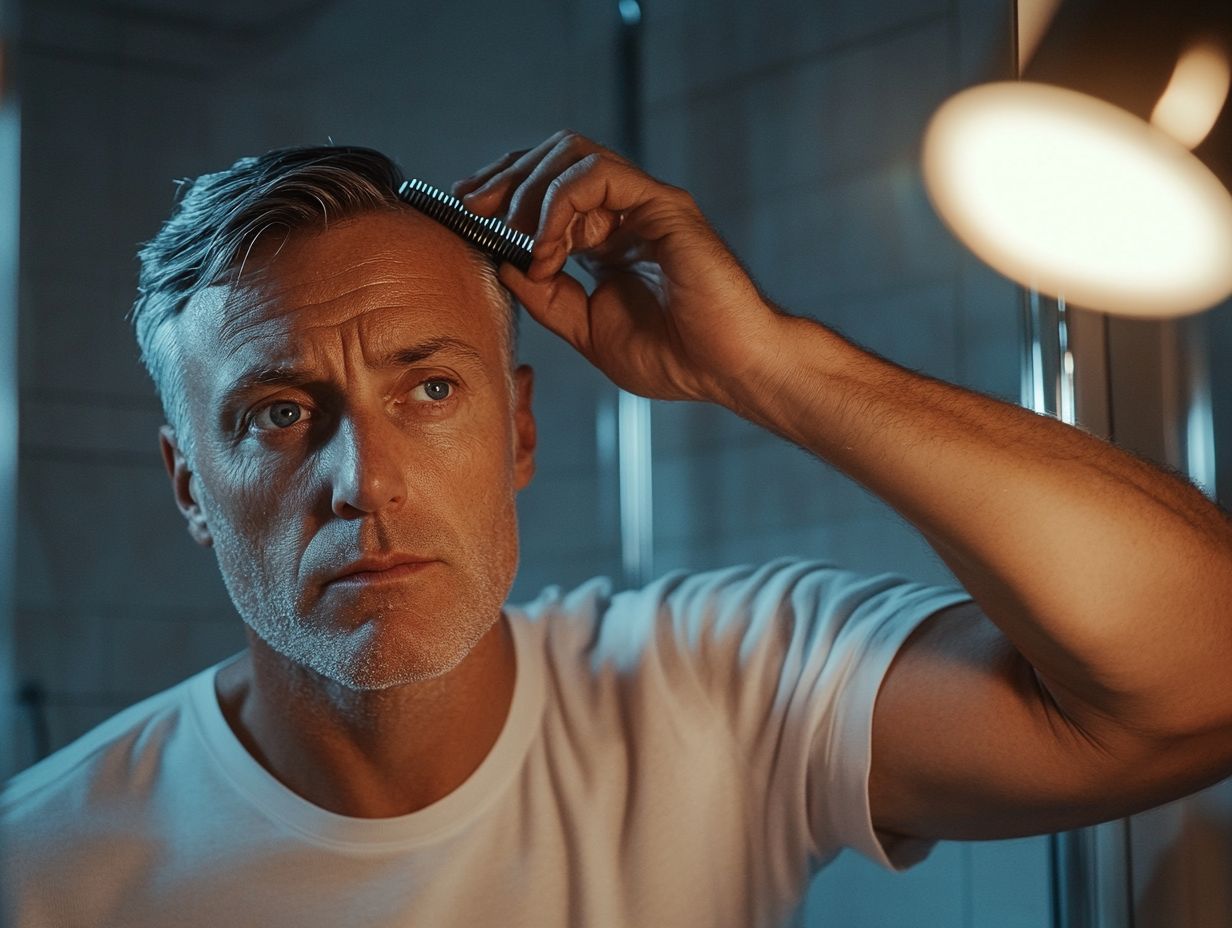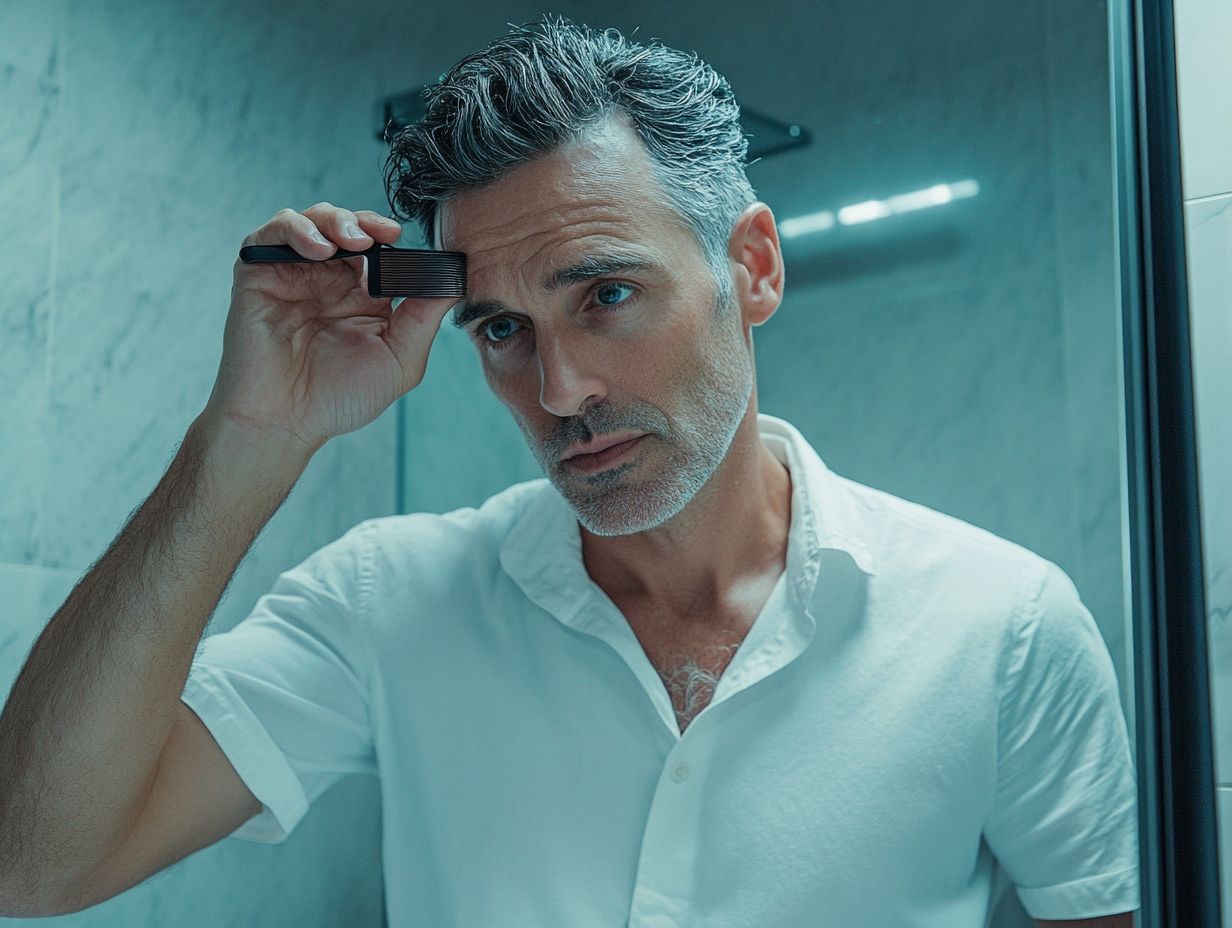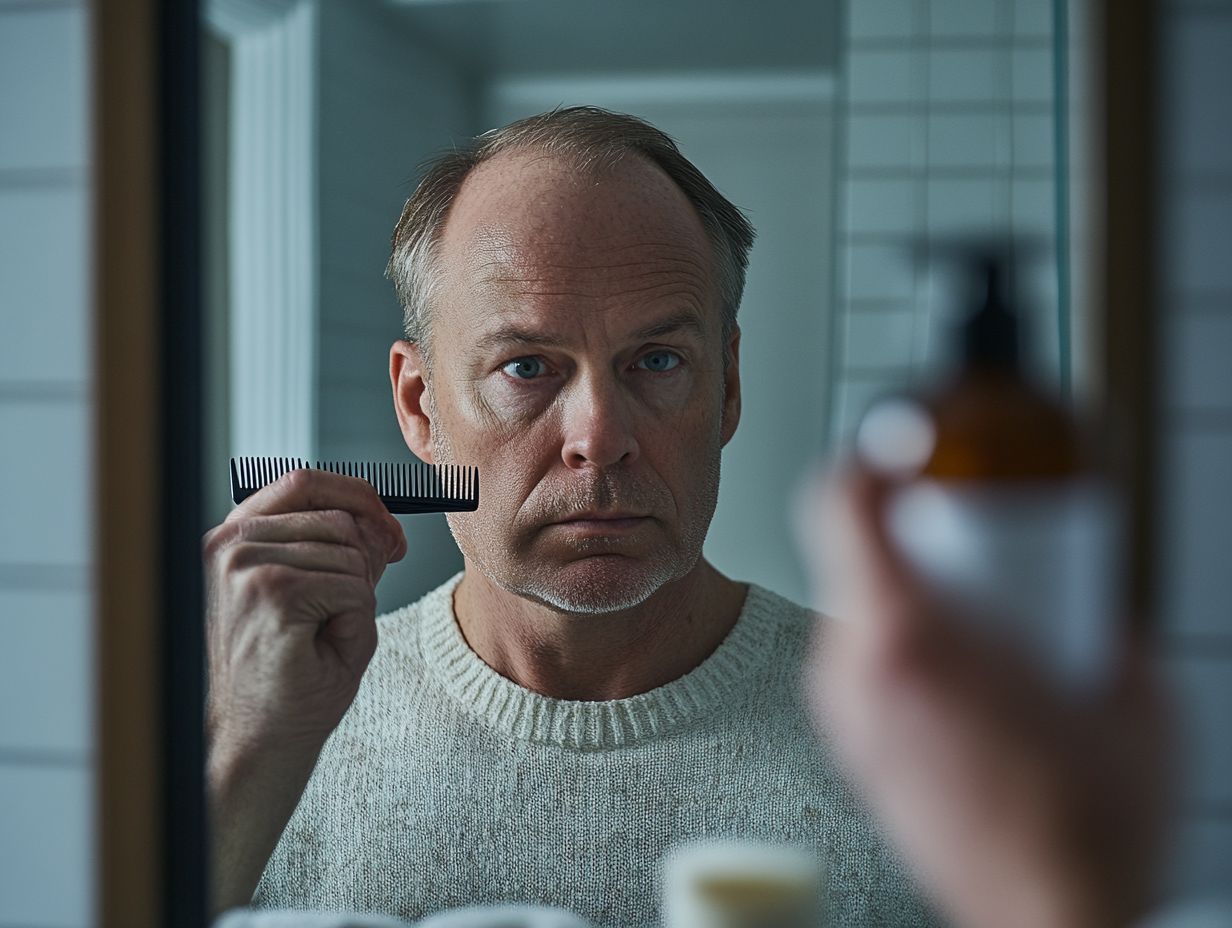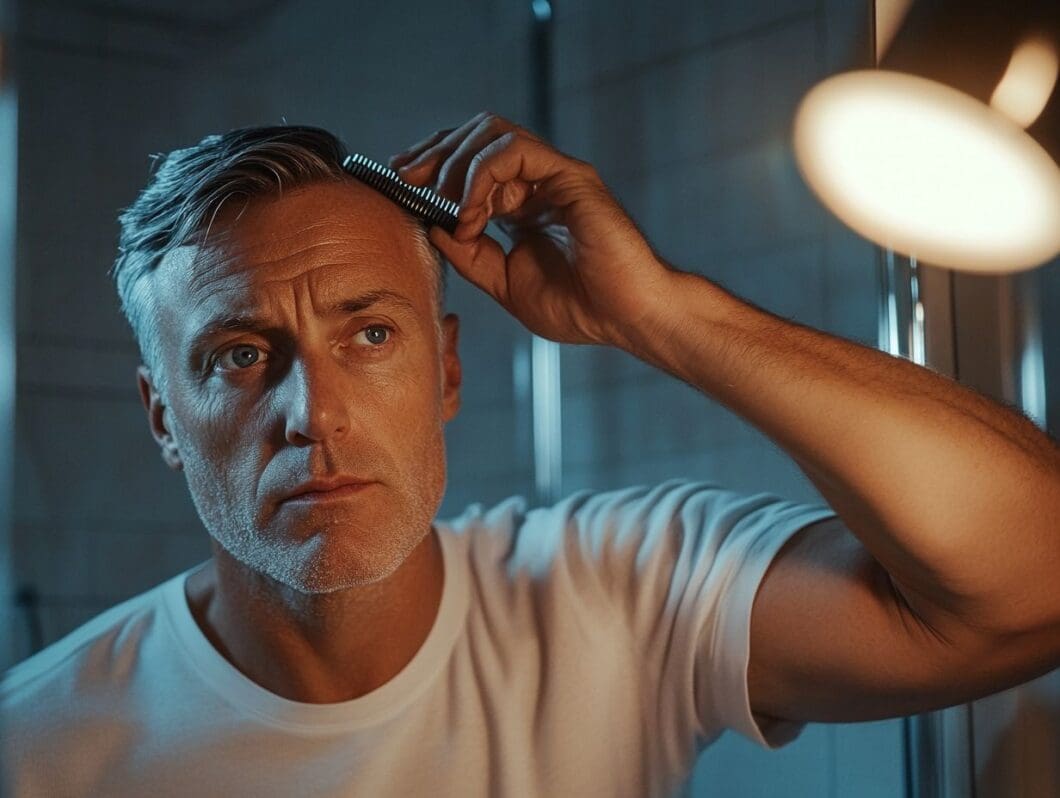Thinning hair can be a challenging experience for many men, often leading to concerns about self-image and confidence.
Understanding the underlying causes and contributing factors is the first step toward tackling this common issue.
This guide explores various treatment options, from medications and topical solutions to surgical interventions like hair transplants.
It discusses the emotional impact of thinning hair and shares strategies for boosting confidence.
- Tips on maintaining healthy habits to prevent further hair loss are also included.
Whether you’re experiencing thinning hair or simply interested in maintaining your mane, this guide is for you.
Key Takeaways:

2. From medications and supplements to topical treatments and hair transplant surgery, there are various options available for treating thinning hair in men. Consulting with a dermatologist can help determine the best course of action.
3. Thinning hair can have a significant impact on a man’s emotional and psychological well-being. Finding ways to boost confidence, such as changing hairstyles or seeking support from loved ones, can help cope with the effects.
4. In addition to seeking treatment, preventing thinning hair is also important. Healthy habits like a balanced diet, proper hair care routine, and stress management can help maintain hair health and prevent further thinning.
Understanding Thinning Hair in Men
Thinning hair in men is a common concern that frequently results in male pattern baldness, scientifically referred to as androgenetic alopecia. This condition impacts millions and is characterized by a gradual loss of hair follicles, primarily on the scalp.
Several factors contribute to this issue, including genetic predisposition, hormonal changes, stress, and nutritional deficiencies. A comprehensive understanding of the underlying causes is essential for addressing hair loss and promoting healthy hair.
Consulting reputable resources, such as the American Hair Loss Association, or seeking expertise from professionals like Dr. Bhavjit Kaur can offer valuable insights into effective solutions. For more information, check out Dealing with Thinning Hair: Options for Men.
Causes and Contributing Factors
Several causes and contributing factors lead to thinning hair, with androgenetic alopecia being the most prevalent condition among men. This condition is frequently associated with genetic predisposition and hormonal changes, particularly elevated levels of testosterone and dihydrotestosterone (DHT).
Hormonal imbalances are not the sole contributors; stress can significantly exacerbate hair loss by disrupting the natural hair growth cycle and pushing hair follicles into a resting phase. Additionally, nutritional deficiencies, particularly those resulting from anemia and inadequate dietary intake, can deprive hair follicles of essential nutrients, thereby impeding their ability to flourish.
For instance, a deficiency in iron and certain vitamins can weaken hair structures, resulting in increased breakage and shedding.
By comprehensively understanding these multifaceted issues, individuals can more effectively address the underlying causes of thinning hair and explore viable solutions, such as those discussed in Dealing with Thinning Hair: Options for Men.
Treatment Options for Thinning Hair

In addressing thinning hair and hair loss, a variety of options are accessible, encompassing both medical treatments and surgical procedures aimed at promoting hair growth and restoring scalp health.
Medications and Supplements
Medications and supplements are essential in the management of thinning hair, with options such as minoxidil and finasteride being among the most recognized for their effectiveness in promoting hair growth.
Minoxidil functions primarily as a vasodilator, increasing blood circulation to hair follicles and revitalizing shrunken follicles, thereby stimulating hair growth. Users frequently report improved hair density with continued application; however, potential side effects may include scalp irritation and unwanted facial hair growth. For more information on managing hair loss, check out Dealing with Thinning Hair: Options for Men.
In contrast, finasteride operates by inhibiting the hormone responsible for hair loss, which often results in reduced hair shedding and possible regrowth over time. It is important to note that some individuals may experience sexual side effects.
Additionally, the incorporation of supplements such as vitamin D is crucial, as it supports overall hair health by promoting the anagen phase of hair follicles and can significantly enhance the effectiveness of these treatments.
Topical Treatments
Topical treatments for hair loss, including protective sprays enriched with natural ingredients, provide a supplementary approach to hair growth by directly targeting the scalp to nurture hair follicles.
These treatments typically contain essential active ingredients such as biotin, saw palmetto, and essential oils, each of which plays a critical role in enhancing scalp health and stimulating follicular activity. Natural ingredients are particularly esteemed for their capacity to reduce inflammation and improve blood circulation, thereby fostering an optimal environment for hair growth. Consistent application of these formulations not only assists in maintaining the scalp’s balance but also promotes the development of stronger, healthier strands.
By integrating such treatments into a daily regimen, individuals can effectively harness the benefits of nature to support hair restoration.
Hair Transplant Surgery

Hair transplant surgery offers a viable surgical solution for individuals experiencing significant hair thinning. This procedure employs healthy hair follicles obtained from donor sites to restore hair in areas affected by balding.
The surgery primarily utilizes two widely recognized techniques: Follicular Unit Extraction (FUE) and Follicular Unit Transplantation (FUT), each presenting unique advantages. FUE involves the extraction of individual hair follicles, providing a minimally invasive approach characterized by reduced scarring. In contrast, FUT requires the removal of a strip of scalp from which hair follicles are harvested, enabling the transplantation of larger volumes of hair simultaneously.
Both methods offer benefits, including enhanced self-esteem and a natural appearance; however, they also carry potential risks, such as infection or scarring. Therefore, proper post-operative care is essential. This includes regular scalp cleaning and the avoidance of direct sun exposure, which are critical for maintaining scalp health and ensuring optimal results.
Coping with Thinning Hair
Coping with thinning hair can present significant challenges, as the emotional and psychological ramifications often result in diminished self-esteem and confidence.
Therefore, it is essential to address these concerns in a holistic manner.
Emotional and Psychological Effects
The emotional and psychological effects of thinning hair can have a profound impact on a man’s self-esteem and confidence, often resulting in social withdrawal and increased anxiety.
These feelings may extend beyond personal concerns, influencing professional interactions and affecting relationships with colleagues and friends. As self-doubt intensifies, the fear of being judged can lead individuals to avoid social situations altogether, resulting in isolation.
It is crucial to acknowledge that these emotional responses, while common, do not need to be faced in solitude. Seeking support through counseling or group discussions can be immensely beneficial, providing individuals with the opportunity to connect with others who share similar experiences related to hair loss.
Sharing experiences and coping strategies fosters a sense of community and relief, promoting a healthier approach to both personal and social interactions.
Ways to Boost Confidence

Enhancing confidence in the face of thinning hair is crucial, and this can be accomplished through a combination of effective styling techniques, the selection of appropriate hair products, and engagement with supportive communities.
One effective strategy is to explore various hairstyles that create the illusion of fullness, such as textured layers or a side part. The use of volumizing sprays and root-lifting mousses can significantly improve the overall appearance of hair. Additionally, it is advisable to seek nourishing shampoos and conditioners that promote thickness and deliver essential nutrients.
Beyond personal styling practices, connecting with support groups or online forums can provide invaluable advice and a platform for shared experiences. This fosters a sense of community and understanding, which can further enhance an individual’s sense of well-being.
Preventing Thinning Hair
Preventing thinning hair necessitates the adoption of healthy habits that promote scalp health and support hair follicles. This approach should emphasize improvements in diet, stress reduction, and overall well-being.
Healthy Habits for Hair Health
Integrating healthy habits into one’s daily routine can significantly enhance hair health, with a focus on dietary improvements, stress reduction, and effective scalp care.
Incorporating regular exercise not only improves blood circulation but also reduces stress, fostering a balanced body and mind, both of which are fundamental for optimal hair growth. Proper nutrition is equally essential; a diet rich in vitamins and minerals, particularly those that support hair follicles such as biotin and vitamins A and E, can contribute to stronger and more resilient strands.
Ensuring adequate hydration throughout the day is crucial for maintaining scalp moisture levels, which helps to prevent dryness and irritation. Plus these practices, gentle cleansing with appropriate shampoos and regular moisturizing treatments for the scalp can prevent buildup and cultivate a healthy environment for hair to thrive.


